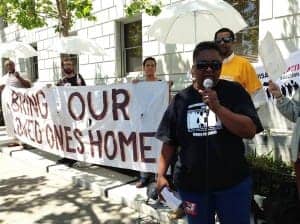by Andrew Szeto
After the revised proposed state budget was released yesterday, activists from around the state are calling on Gov. Jerry Brown to remove the $500 million outlined for jail expansion. With $15 billion in cuts to social safety net programs, prison reform groups like Californians United for a Responsible Budget (CURB) are questioning why the state is increasing spending on prisons and jails instead of social programs and public education.

The budget revision released May 13 includes additional funding to the $500 million for jail expansion already granted to 15 counties in January, which puts the total jail spending at $1.7 billion over the last three years. San Francisco’s replacement jail project, spearheaded by Sheriff Ross Mirkarimi, was denied funding early in January.
Brown proposed the $500 million for jail expansion in his initial budget in January, and in his revised budget, it appears that additional funding will be allocated with the Corrections budget set to increase 2.9 percent to $9.8 billion.
In February, a Legislative Analyst Office report questioned the need for an additional $500 million for jail expansion. With very little research compiled in counties across the state, the report stated that the “administration has not carried out an adequate analysis of the extent to which counties need additional funds.” Since the LAO report was released, it does not appear that more studies have been conducted or that the governor took these concerns into consideration.
More concerns were raised last week at the May 8 Senate Budget Subcommittee on Corrections hearing. The subcommittee voted 3-0 against Brown’s inclusion of the additional $500 million and instead voted to have such funds available for alternative projects like transitional housing and mental health services.
Fighting prison expansion
The statewide coalition CURB has been fighting against prison and jail expansion for the past few years and has been putting pressure on the California Legislature to focus on alternatives to incarceration. Their community mobilizing and action has played a large part in changing the perspectives around prison and jail reform.
“The $500 million, because of significant community opposition, has gotten a lot of attention,” CURB Statewide Coordinator Emily Harris told Beyond Chron.
In late April, CURB organized and was able to get both SB 1377 and AB 2356 struck down in the state Legislature. The bills would have added 32,000 beds to the prison system and increased jail construction funds to $1.2 billion, respectively. If both of those measures had passed, an additional $4 billion would have been allocated for new prisons and jails across the state.
Harris credits the mobilizing done to defeat the two bills with helping to get the Corrections Subcommittee to vote in opposition to Brown’s proposed budget.
The statewide coalition CURB has been fighting against prison and jail expansion for the past few years and has been putting pressure on the California Legislature to focus on alternatives to incarceration.
“Because of all that opposition against those two bills, they ended up losing,” Harris said.
The CURB coalition is made up of 46 organizations from across the state, all with a diverse range of interests and constituencies.
“It was an example of a diverse group of organizations in California who showed that we don’t want this in our backyard,” Ashley Nguyen, organizer with Sin Barras from Santa Cruz, told Beyond Chron.
“We are all tackling it from different angles – whether it’s healthcare, childcare, abolition, incarceration, policy reform – and that brings rich and full perspective to people who are making these decisions and enables us to make big wins and big changes.”
CURB’s ability to unite these groups has led to more community power, and they are pushing for the state to spend the $500 million on other vital social services that are alternatives to incarceration.
“There has been movement in the direction toward what communities that have been working on realignment are calling for,” Harris said.
San Francisco jail replacement
In January, Sheriff Mirkarimi was denied $80 million of state grant money for the replacement of the Bryant Street jails, which have seen increased scrutiny for their horrid conditions and seismically unsafe structures. A Board of Supervisors hearing was also held that month, where dozens of activists protested the construction of a replacement jail, citing the already low number of people in the city’s jails and their declining population.
The replacement jail process is still a year to two in the making, but Mirkarimi believes that with the current conditions of the jails, something needs to be done.
“Everybody agrees we need a facility,” he told Beyond Chron.
With a possible $500 million on the table if Brown’s budget passes as is, the city could apply for funding again.
“If in fact we still need the jail replacement facilities, and at this point we do, using state money is better than our municipal money,” Mirkarimi said.
The jail replacement project was left off June’s emergency response bond, because proponents believed it would not be favored by voters.
“If the money comes from Sacramento, then the counties will try to get it,” Harris said. “If the money wasn’t available to San Francisco, it would be more likely to see the supervisors move away from a jail construction project and towards building out alternatives.”
Recent reports, though, have shown that the jail population is declining, and Mirkarimi says that jail replacement may not even be necessary if the trend continues.
“If the numbers continue to drop in the jail population, and it’s evaluated where it’s going to hold steady, then this question can be up in the air about the jail itself.”
Rallies organized by CURB were held across the state May 14.
Andrew Szeto, a San Francisco-based activist, journalist and writer, can be reached at twitter.com/andrewszeto. He is an alumnus of UC Santa Cruz, where his senior thesis was “Struggling for the Commons: An Ethnography of Ruins, Gentrification, and Social Justice in Detroit, Michigan.” This story first appeared in Beyond Chron.





